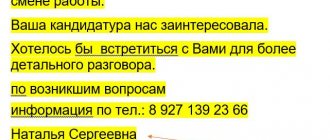When applying for a job, in addition to the employment contract, an apprenticeship contract may also be concluded if the employer plans to pay for the training of new employees in order to obtain highly qualified personnel. According to the terms of the agreement, if an employee is dismissed early, he is obliged to reimburse training costs by deducting money from his salary.
When a student agreement is not drawn up:
- Short-term training courses.
- Seminars.
- One-day training.
- Involving a specialist for lectures on your own initiative.
What is a student agreement?
Before understanding the grounds for deductions from wages, you need to familiarize yourself with the concept of a “student agreement”. It means an agreement concluded between an employer and an employee looking for a job, or with an already employed employee, if he needs to receive education on the job or without interruption from work, but the specialization in study and place of work coincides (Article 198 of the Labor Code of the Russian Federation).
Here is an example of when a student agreement is required:
Head of the ambulance station Kovalev S.A. wants to hire paramedic N.A. Popov, who already has the appropriate education. He is required to take advanced training courses lasting 3 months. All this time he can work with partial interruption from work, because The “day/night/48” schedule allows you to simultaneously study and perform work functions.
The SSMP has an agreement with an educational medical institution, where doctors are sent for vocational training. Popov N.A. got a job, and in addition to the employment contract, an apprenticeship agreement was concluded, according to which he is obliged to undergo training and work for the employer for three years after that.
Documenting
By sending an employee for training, the employer enters into an agreement with an educational institution (an organization engaged in educational activities). Sample forms of contracts for the provision of educational services are given in orders of the Ministry of Education and Science of Russia dated December 9, 2013 No. 1315 and dated November 21, 2013 No. 1267.
Situation: what documents can confirm the provision of educational services to an employee of an organization for accounting purposes?
The legislation does not contain a list of documents that can be used to confirm that an educational service was provided. In accounting there is only a requirement that each fact of economic life must be documented in a primary accounting document (Part 1, Article 9 of the Law of December 6, 2011 No. 402-FZ).
The fact of provision of educational services can be confirmed, for example, by a bilateral act. This document must be signed by the employer and the educational institution (organization carrying out educational activities) upon completion of the employee’s training or at another time established by the contract.
The main thing is that the supporting document contains all the mandatory details specified in Part 2 of Article 9 of the Law of December 6, 2011 No. 402-FZ.
In addition to these documents, you can attach a copy of your educational document (for example, a copy of a diploma, certificate or academic transcript). Their educational institutions issue them in most cases (Article 60 of the Law of December 29, 2012 No. 273-FZ).
How is the receipt of compensation for training costs reflected in the organization's accounting?
The only basis for deducting training costs from your salary is the existence of an apprenticeship contract, which is concluded in addition to the employment contract. If there is none, the employer does not have the right to reimburse expenses forcibly or at the request of the employee himself.
Despite the fact that Art. 137 of the Labor Code of the Russian Federation imposes certain restrictions on retention; in this situation, it is necessary to be guided by the norms of Art. 249 of the Labor Code of the Russian Federation, where compensation is calculated in proportion to the time worked.
When restrictions apply:
- When an advance is paid, if the employee does not work until the end of the month.
- To return amounts overpaid by mistake.
- Upon dismissal before the end of the year, if the employee has already used paid leave.
Accounting entries
To calculate the amount of deduction, you need to calculate how many calendar days the employee worked after training and the amount of money spent on it. Accounting entries are also prepared:
- Debit 73, Credit 91-1, which reflects the total debt of the employee.
- Debit 70, Credit 73, which shows compensation for training expenses.
- Debit 50, Credit 73 – indicates the entry of debt into the cash register.
It is important to remember that, in accordance with Part 1 of Art. 248 of the Labor Code of the Russian Federation, by order of the employer, compensation may be collected, the amount of which does not exceed the employee’s average monthly earnings. No more than 20% of the salary can be withheld one-time (Article 138 of the Labor Code of the Russian Federation).
“To calculate average earnings, it is necessary to take into account the last 12 calendar months of the employee’s labor activity, as well as the average monthly number of calendar days,” says Yu.P., head of the department of labor law at the Higher School of Economics. Orlovsky.
The procedure for calculating compensation is the same for organizations operating in all industries, incl. and budget.
Employee training at the expense of the employer
The employer can provide training to employees and job candidates, sending them to training, retraining and advanced training. Where can training take place: at the enterprise itself or in an educational institution? Who pays for the training? Is the employee required to work for some time after training or can he quit? Should he be reimbursed for training costs in case of dismissal?
Who decides whether training is needed?
In accordance with Article 118 of the Labor Code of the Republic of Kazakhstan, the need and scope of professional training, retraining and advanced training for the functioning and development of the organization are determined by the employer. An employee may propose sending him for training, but the decision is made by the employer.
Forms of training
The Labor Code in Article 116 distinguishes the following forms of training:
- vocational training is a form of vocational training aimed at personal development to acquire new or changed professional skills necessary to perform a certain type of work;
- retraining is a form of vocational training that allows you to master another profession or specialty;
- advanced training is a form of professional training that allows you to maintain, expand, deepen and improve previously acquired professional knowledge, skills and abilities.
Training agreement
According to Article 116 of the Labor Code, a training contract is a written agreement between the employer and the student on the conditions of professional training, retraining and advanced training.
The training contract must comply with the requirements established by Article 144 of the Labor Code and must contain:
- an indication of a specific profession or qualification acquired by the student;
- rights and obligations of the employer and student;
- duration of training and period of service with the employer after completion of training;
- the procedure and cases of reimbursement to the employer of costs associated with training in proportion to the unfinished period of service;
- guarantees and compensation payments related to training;
- responsibility of the parties.
The training agreement may contain other conditions by agreement of the parties.
Who can an employer train?
According to Article 118 of the Labor Code, an employer can provide training to both its employees and other persons who are not in an employment relationship with him. Such persons are called “trainees”.
Where does the training take place?
Training is carried out (Article 118 of the Labor Code):
- directly in the organization;
- in educational organizations implementing educational programs of technical and vocational, post-secondary, higher and postgraduate education;
- in other organizations providing professional training, retraining and advanced training of personnel.
Training in educational organizations
In accordance with Article 40 of the Law of the Republic of Kazakhstan “On Education,” educational organizations are legal entities that implement one or more educational training programs and (or) provide the maintenance and upbringing of students and pupils. The activities of educational organizations are regulated by the Law “On Education”, as well as standard rules for the activities of educational organizations of the corresponding type and charters developed on their basis. The right to conduct educational activities arises for educational organizations from the moment they receive a license, unless otherwise provided by law.
Training in the organization
Professional training, retraining and advanced training of employees in the organization are carried out by the employer himself. They also determine the forms of education. General requirements for professional training, retraining and advanced training of personnel in an organization are determined by Order of the Minister of Health and Social Development of the Republic of Kazakhstan dated December 28, 2020 No. 1045 “On approval of general requirements for professional training, retraining and advanced training of personnel in an organization.”
These requirements include having:
- in the Charter (Regulations) of the organization, standards for professional training, retraining and advanced training of personnel for organizations that directly provide professional training, retraining and advanced training of workers;
- working curricula and programs for professional training, retraining and advanced training of personnel;
- textbooks and educational and methodological complexes for relevant professions (specialties);
- training agreement (a written agreement between the employer and the student on the conditions of professional training, retraining and advanced training directly in the organization) or an agreement on the provision of educational services (a written agreement between the employer and the organization implementing additional, technical and vocational, post-secondary, higher and postgraduate educational programs education on the conditions of professional training, retraining and advanced training).
Only if these requirements are met, the employer has the right to independently conduct training.
The employee’s obligation to work after training
In accordance with the concluded training agreement, upon completion of professional training, retraining and advanced training, the student is obliged to work for the employer for the period agreed upon by the parties to the agreement. The absence of such a condition in the contract releases the employee from the obligation to work.
In case of discrepancies with other documents (employment contract, internal rules), the terms of the training contract are taken into account.
Can an employer refuse an employee who decides to quit without working for the agreed period after training?
The employer does not have such a right, since forced labor is prohibited by virtue of the requirements of Article 7 of the Labor Code. That is, the employee has the right to quit in any case. In this case, consequences arise in the form of the employee’s obligation to reimburse training costs.
Reimbursement by employee of costs associated with training
According to subparagraph 11) of paragraph 1 of Article 23 of the Labor Code, the employer has the right to reimbursement of its costs associated with training an employee, if this is stipulated by the terms of the training contract.
Cases and procedures for reimbursement of costs associated with training are currently not regulated by the Labor Code.
In accordance with paragraph 4 of Article 118 of the Labor Code, the training agreement must provide for the period of service with the employer after completion of training, as well as the procedure and cases for reimbursement to the employer of costs associated with training in proportion to the unfinished period of service.
In this regard, it is recommended that the cases and procedure for reimbursement of training costs be specified in detail in the training agreement.
How are training costs determined?
To avoid disputes, the amount of costs for employee training must be fixed in the training contract. Otherwise, the employer will need to justify the actual costs of training. If in the case of training in an educational organization this will not be difficult, then in the case of independent training it is not always possible to document the costs.
An employee should not pay for unconfirmed and unjustified training expenses.
The amount to be paid must cover the costs of training the employee. It is impossible, for example, to include in such expenses expenses for a business trip to the place of training, since in accordance with Article 127 of the Labor Code such expenses are compensated by the employer. It would be unlawful to establish an arbitrary amount of payments depending on the time not worked (for example, 100,000 tenge per month).
How are training costs collected?
To recover training costs, if the employee does not voluntarily reimburse them, the employer will be forced to go to court. In accordance with paragraph 2 of Article 115 of the Labor Code, deductions from an employee’s salary to pay off his debt to the employer can only be made with the written consent of the employee.
‹Training of employees. Training. Up Professional training of persons who are not employees of the organization ›
How is withholding reflected for tax purposes?
Enterprises using the general taxation system must contribute compensation to unrealized income if an employee quits early (Article 250 of the Tax Code of the Russian Federation). In this case, income is defined as the amount of compensation as of the actual date the quitter recognized his obligation to pay expenses to the employer. If the obligation to pay compensation is recognized through the court, the date on which the court decision enters into force is indicated.
If the cash method is used, the amount of unrealized income will be equal to the amount of deductions from wages, and the date is the day when the compensation was made.
Let's look at a detailed example:
In March, the LLC sent an employee for training, spending 23,600 rubles. An agreement was drawn up with her, under the terms of which she must work at the enterprise for at least 12 months. The employee completed the course on May 7, and in December she decided to quit by submitting an application. According to the terms of the contract, she is obliged to compensate 7,177 rubles.
The employee’s salary for December was 25,000 rubles, and the employer has the right to withhold no more than 25%, i.e. only 4,350 rubles, which were deducted upon dismissal. The remaining 2,827 rubles. she contributed to the organization's cash desk in January.








